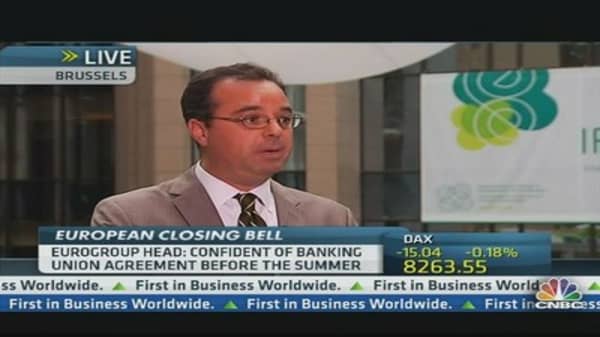"We need to make clear both to depositors and financial markets how in the future we will deal with that in Europe. I think we're making good progress."
Banking union is one of the items on the agenda for the Eurogroup meeting in Brussels on Monday, though Djisselbloem said he did not think a decision would be taken yet.
"There's a little time left – we have to get it right this time. It is very important that we do it thoroughly, and that we have a very solid banking union. So I'm putting all the efforts there," he said.
But Germany's finance minister, Wolfgang Schaeuble, reiterated his country's resistance to the proposal this weekend, once again throwing the possibility of a region-wide banking union into doubt.
Writing in the Financial Times newspaper on Sunday, he said that a single European Union (EU) bailout agency and rescue fund for the 17-nation currency bloc's ailing banks was not viable without respect for EU treaties.
(Read More: ECB's Visco: Deposit Rates Could Go Below Zero)
Although the merits of a banking union were "rarely disputed," Scheauble added: "there is a debate about how to shape its governance and accountability; and about what we can deliver in the short term and what our ultimate goals should be."
He said the EU risked its credibility by setting up a banking union quickly as it had responsibilities and powers defined by its treaties.
"To take them lightly, as is sometimes suggested, is to tamper with the rule of law," he said.
The idea of a Europe-wide banking union and single supervisory body to oversee the zone's banks was touted last July as a way of regulating the industry and closing down problematic banks easily.
Though a single supervisory institution is supported by Germany, it has vociferously resisted the idea of a bank rescue fund amid fears it will become financially liable for other countries' banking debts.
(Read More: Germany Backtracks on Banking Union)
Whether or not its concerns are justified, Germany's government could continue to resist any plans that could prove unpopular with its electorate ahead of elections in September.
The European Central Bank is expected to take the mantle of supervisor in the summer of 2014, with the European Commission presenting its plan for a resolution agency and bank rescue fund shortly.
Both agencies argue that centralizing powers to oversee bank restructurings or closures are possible without treaty change, an argument which Scheauble again rejected on Sunday.
(Read More: Why the ECB Is 'Stupid' Europe's Best Hope)
He said there needed to be clarity on depositor accountability for saving ailing banks within the bloc.
"Pursuing this clean-up exercise swiftly and without burdening taxpayers will require more than cross-border supervision," he wrote.
"It will need a mechanism to restructure or wind up the weakest banks in an orderly, predictable and uniform fashion throughout Europe…[but as] Cyprus has shown, we need predictability about when shareholders and creditors – and in what order – would be called upon to bail in or wind up a bank."
He continued: "The European Commission will soon put forward a proposal for a resolution mechanism. We will assess it with an open mind."
"Yet while today's EU treaties provide adequate foundation for the new supervisor and for a single resolution mechanism, they do not suffice to anchor beyond doubt a new and strong central resolution authority," he added.
"We should not make promises we cannot keep. The overly optimistic predictions about a single supervisor starting work as early as January 2013 cost the EU credibility."
(Read More:





